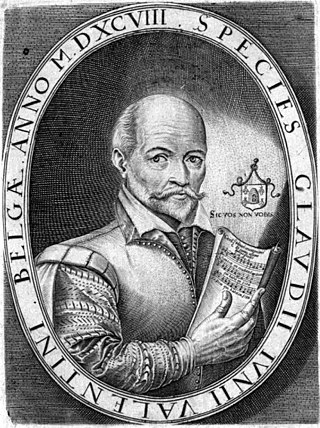Related Research Articles
Antoine Brumel was a French composer. He was one of the first renowned French members of the Franco-Flemish school of the Renaissance, and, after Josquin des Prez, was one of the most influential composers of his generation.
Nicolas Gombert was a Franco-Flemish composer of the Renaissance. He was one of the most famous and influential composers between Josquin des Prez and Palestrina, and best represents the fully developed, complex polyphonic style of this period in music history.
Pierre de Manchicourt was a Renaissance composer of the Franco-Flemish School.
Jean Richafort was a Netherlandish composer of the Renaissance, a member of the third generation of the Franco-Flemish School.

Claude Le Jeune was a Franco-Flemish composer of the late Renaissance. He was the primary representative of the musical movement known as musique mesurée, and a significant composer of the "Parisian" chanson, the predominant secular form in France in the latter half of the 16th century. His fame was widespread in Europe, and he ranks as one of the most influential composers of the time.
Hilliard Ensemble was a British male vocal quartet originally devoted to the performance of early music. The group was named after the Elizabethan miniaturist painter Nicholas Hilliard. Founded in 1974, the group disbanded in 2014.
Matthaeus Pipelare was a Netherlandish composer, choir director, and possibly wind instrument player of the Renaissance.

Les Arts Florissants is a Baroque musical ensemble in residence at the Théâtre de Caen in Caen, France. The organization was founded by conductor William Christie in 1979. The ensemble derives its name from the 1685 opera Les Arts florissants by Marc-Antoine Charpentier. The organization consists of a chamber orchestra of period instruments and a small vocal ensemble. Current notable members include soprano Danielle de Niese and tenor Paul Agnew, who has served as assistant conductor since 2007. Jonathan Cohen is also on the conducting staff; Christie remains the organization's Artistic Director.
The Harp Consort is an international early music ensemble directed by Andrew Lawrence-King, specialising in Baroque opera, early dance-music, and historical World Music.
Pro Cantione Antiqua of London (PCA) is a British choral group which was founded in 1968 by tenor James Griffett, counter-tenor Paul Esswood, and conductor and producer Mark Brown. Their first concert was at St Bartholomew's, Smithfield with Brian Brockless conducting but, from an early stage, they were closely associated with conductor and musicologist Bruno Turner. Arguably, they were the leading British performers of a cappella music, especially early music, prior to the founding of the Tallis Scholars.
Crawford Young is an American lutenist and musicologist residing in Basel, Switzerland. He is the director of the Ferrara Ensemble, Ensemble Project Ars Nova, Shield of Harmony, and is a long time accompanist of Andreas Scholl.
The Diapason d'Or is a recommendation of outstanding (mostly) classical music recordings given by reviewers of Diapason magazine in France, broadly equivalent to "Editor's Choice", "Disc of the Month" in the British Gramophone magazine.
Carolus Luython was a late Renaissance composer of the "fifth generation" of the Franco-Flemish school.
August Nörmiger was a German composer and court organist in Dresden. He was born and died in Dresden.
The Ensemble Clément Janequin is a French early music ensemble founded in 1978 and specializing in the chansons of the Renaissance and early Baroque.
Judith Anne Nelson, née Manes was an American soprano, noted for her performances of baroque music at the beginning of the "early music revival" of the 1970s and 1980s.
The ensemble A Sei Voci was a French vocal group founded in 1977 and which ceased in 2011.
Pascal Bertin is a French countertenor.
Jean-Pierre Ouvrard was a French musicologist, music educator, researcher at the François Rabelais University and choral conductor.

Bruno Boterf is a contemporary French tenor, specialising in Baroque and early music.
References
- ↑ Utopia Triumphans Sony CD, microphone layout
- ↑ Motets Wallons track list
- ↑ Ars Moriendi (LP) track list
- ↑ Track list in Dutch
- ↑ Rereleased 2009 with texts available as pdf from Huelgas Ensemble homepage.
- ↑ Utopia Triumphans track list
- ↑ "Tears Of Lisbon / Van Nevel, Huelgas Ensemble, Rocha, Et Al". arkivmusic.com. 1996. Retrieved 4 January 2012.
- ↑ Paul Van Nevel (2004). Nicolas Gombert et l'aventure de la polyphonie franco-flamande. Editions Kargo. ISBN 978-2-84162-087-6.